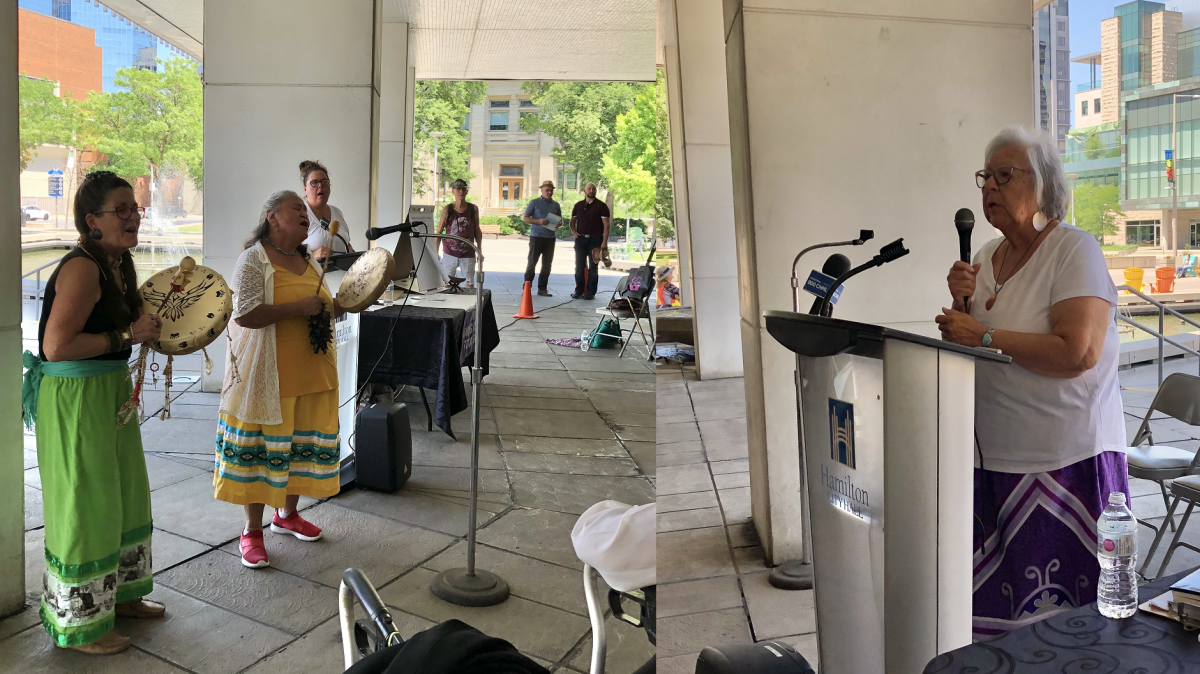Indigenous community members in Hamilton gathered in front of city hall on Tuesday to celebrate National Indigenous Peoples Day in person for the first time since before the pandemic.

The celebration included music and speeches from local elders, including discussions about how Hamilton has recognized truth and reconciliation in recent years.
Last year, city council officially endorsed the Urban Indigenous Strategy (UIS), which aims to strengthen the city’s relationship with the Indigenous community and promote a better understanding among all residents about Indigenous histories, cultures, experiences and contributions.
Marilyn Wright, chair of the city’s Indigenous Advisory Committee, said the strategy has empowered the committee to do things that they “never thought possible.”
“We can make our own decisions, to a point,” she said. “We’ve never felt like we could do that before. And we’re not just a token committee for the city. They allow us, with the strategy, to make headways in things that are important to the Indigenous community for the city of Hamilton.”

The ceremony also heard from Nathan Muir, a two spirit and nonbinary member of the Mohawk Nation, who spoke about the importance of emotion – especially anger – which a lot of people have felt over the past few years for a number of reasons.

Get daily National news
“With anger, we always have two choices – we can hold onto it, let it drive us, and use it to push through all the obstacles. But we tend to forget through that path that sometimes we lose ourselves along the way in that anger, and we become that spirit of anger.
“The other choice is to let it go and move forward. And while that may be healthy in some instances, sometimes it’s not the recommended course of action.”
“However, neither of these choices is a right or wrong answer because Creator gave us the gift of that choice.”
Norma Jacobs, who is Onkwehowe, Wolf Clan of the Cayuga Nation, and from Six Nations of the Grand River, was the event’s keynote speaker.
She shared her experiences and thoughts on what reconciliation means in a moving speech to those who gathered in the forecourt.
“I don’t think that there can ever be reconciliation, because we continue to think that someone is greater than us,” she said.
“How we can do that is to revitalize our values, to look at our values, and what does it mean, to share? You know, what does it mean to give someone something without expecting something back? What does it mean to look after your elders? What does it mean to care for your children and to give them a place to live?”
Shelly Hill, manager of Indigenous Relations for the city of Hamilton, wrapped up the formal speech portion of the event with a reminder of why these gatherings are so important.
“Today we honor and recognize and celebrate us as Indigenous Peoples. Today serves as a reminder of our strength and resilience; years of oppression, and generational trauma; the disposition of land, the residential school system, and the discovery of our children who didn’t make it back to their home fires. We honour you.”
The Hamilton sign in front of city hall was illuminated white, yellow, red, and black to mark Indigenous Peoples Day.
On July 1, it will be lit in orange in honour of the children, families and survivors of Canada’s residential school system.











Comments
Want to discuss? Please read our Commenting Policy first.